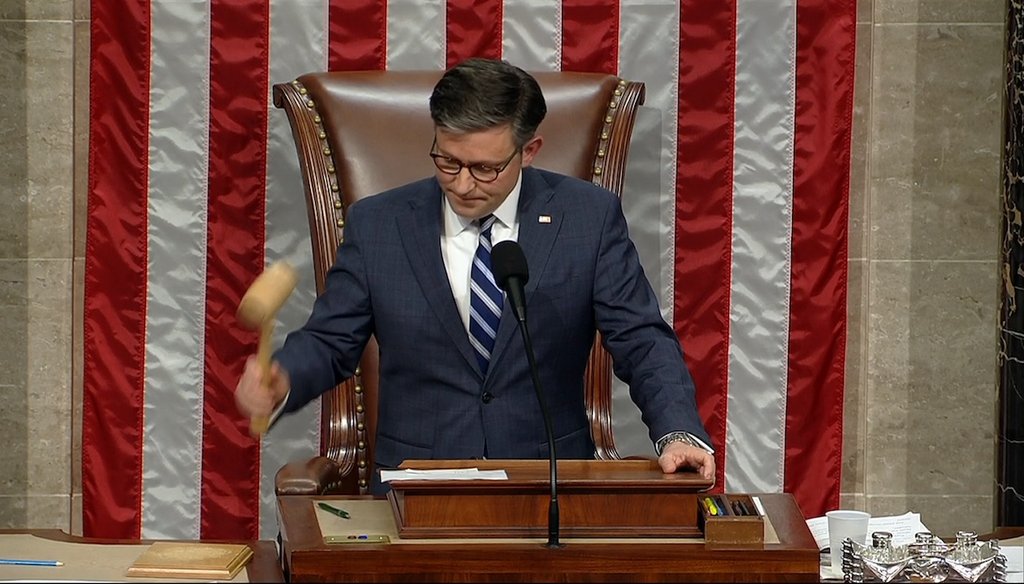Stand up for the facts!
Our only agenda is to publish the truth so you can be an informed participant in democracy.
We need your help.
I would like to contribute

House Speaker Mike Johnson bangs the gavel Feb. 13, 2024, in the House chamber. (AP)
The House is on track to be narrowly divided for a third straight Congress, forcing the Republican speaker to use every bit of leverage to keep members in line on tough votes.
As the final House races’ results fall into place, it appears that Republicans will win a slim House majority. Unexpected developments, such as a member’s death or resignation, could jeopardize the Republicans’ ability to enact their agenda.
As of Nov. 18, Republicans had secured 218 seats and the Democrats had 212. That left five seats uncalled. In three uncalled seats, the Republicans were ahead; the Democrats were ahead in two. If the parties’ current leads hold, the final GOP edge in the House will be 221-214. That means Republicans could afford to lose only three defecting votes if all Democrats were present and united.
The 221-214 margin is identical to the majority the Republicans had for much of the current Congress. It’s also one just one seat off from the Democratic majority in the Congress before that.
Complicating matters for Speaker Mike Johnson, R-La., is that President-elect Donald Trump has tapped three Republican House members for top appointments: Matt Gaetz of Florida for attorney general, Elise Stefanik of New York for United Nations ambassador and Mike Waltz of Florida for national security adviser. Gaetz has already resigned from the current Congress. But because he had won election to the incoming Congress, he could still land there if his attorney general nomination fizzles.
Sign up for PolitiFact texts
If all three Trump picks’ seats go vacant, and if every other seat is filled as expected, that would erode the GOP’s slender majority. Their 221-214 edge would drop to 218-214, and Republicans could afford to lose only one member defecting to the Democrats (or three absences) to avoid a tie or being outvoted by Democrats.
Waltz and Stefanik (and possibly Gaetz) could time their departure to be able to vote for the next speaker, but their vacancies could last a while. Every House vacancy must be filled through a special election, and it takes months to allow for ballot qualification, primaries, a general election and certification of results. In Florida, Republican Gov. Ron DeSantis can make his state’s special elections as speedy as the law allows to aid the GOP House majority, but New York Gov. Kathy Hochul, a Democrat, could take her time in setting an election date for Stefanik’s seat.
The House has seen slim divides periodically since the dawn of the 20th century: the margin was just one vote from 1917 to 1919, and two votes from 1931 to 1933. But partisan conflict was less intense back then, and the parties didn’t scrap and claw for every momentary political advantage, as they often do today.
Here’s what factors could influence control of the incoming Congress.
How can a speaker be ousted?
Speakers are chosen on the first day of a new Congress; they serve in that position until something else intervenes, namely, a "motion to vacate the chair."
That’s a parliamentary maneuver to call a new speaker vote in the middle of a Congress. If the motion passes, the speakership goes vacant and the House holds a new speaker election, led by a speaker pro tempore. (The ousted speaker designates the speaker pro tempore well before the motion to vacate is voted on. This replacement is publicly unidentified unless, and until, the chair is declared vacant.)
Motions to vacate the chair have been rare. More than a century ago, then-Speaker Joseph Cannon, R-Ill., called a vote as a dare to his opponents and survived it. In 2015, then-Rep. Mark Meadows, R-N.C., moved against then-Speaker John Boehner, R-Ohio. A motion to vacate never went to a vote, though it likely accelerated Boehner’s departure from the speakership weeks later.
Everything changed in 2023, when a rebel faction in the House Republican Conference pursued a motion to vacate and prevailed, for the first time in the chamber’s history. A sliver of Republicans who were angered by cooperation between then-Speaker Kevin McCarthy, R-Calif., and House Democrats on key spending bills withheld their support during the vote on the motion to vacate. The House ground to a halt for three weeks as Republicans sought a consensus candidate. After multiple fruitless attempts to assemble a majority for speaker, Johnson managed to get enough votes.
Will it still take just one lawmaker to force a vote on ousting the speaker?
To avoid the chaos of McCarthy’s ouster, Johnson and the House GOP’s restive portion said that they’d agreed to increase the minimum number of votes needed to force a motion to vacate from one to nine. That new rule will be formalized as one of the new House’s first acts in January, but the Republican conference seems OK with the shift, wanting to focus instead on passing Trump’s agenda, CNN reported.
The one-vote threshold in the outgoing Congress is unusually narrow; it was enacted in 2023 as a concession by McCarthy to win votes from skeptics of his speakership bid. The threshold was much more stringent under McCarthy’s Democratic predecessor, former Speaker Nancy Pelosi, D-Calif.; under Pelosi, such motions were blocked unless party leaders pursued them.
Could Democrats use the motion to vacate to depose Johnson as speaker?
In ordinary times, a majority should be able to close ranks and defeat any motion to vacate proposed by the minority. But with a margin as small as the one that seems likely in the next Congress, Democrats can dream of a chamber takeover.
Democrats would need only a few Republican absences to secure a numerical majority, and in theory, they could offer a motion to vacate when they’d be able to win.
"It’s definitely something that can be done," said Eric Schickler, political scientist at the University of California-Berkeley
The rewards could be considerable. The new speaker, presumably House Minority Leader Hakeem Jeffries, D-N.Y., could quickly set about reshaping committee ratios and chairs, which always favor the majority party. The most urgent of these changes would be to flip the majority of the Rules Committee, which determines how to consider controversial legislation, such as how much time to allow for debate and which amendments to offer.
However, just because Democrats could pull off this gambit doesn’t mean they would. It might not be worth trying if the numerical majority was sustainable for a week or less, experts said. And the majority would likely deploy delaying tactics before a vote so they could get their ill or traveling members back to Washington.
"If it were just a very temporary majority due to absences, it is very, very unlikely they'd do it," Schickler said.
Democrats still have good reason to keep a close eye on Republican absences, experts said — just not for a motion to vacate.
With a few GOP absences, a unified Democratic front could defeat "highly partisan policy proposals," said Matthew Green, a Catholic University of America political scientist. "They can exploit absences to delay, if not defeat, bills and amendments, creating embarrassing headlines for House Republicans."
Ultimately, there are limits to what a party will risk for a temporary advantage, said Donald Wolfensberger, congressional scholar at the Woodrow Wilson International Center for Scholars and a former staff director of the House Rules Committee.
"I may still be naive after all these years, but I think both parties will want to play it straight and sane," he said. "Doing the opposite of the Golden Rule yields one result: What goes around comes around."
Our Sources
U.S. House, "Party Divisions of the House of Representatives, 1789 to Present," accessed Nov. 14, 2022
Politico, "What’s left to call in the battle for the House," Nov. 18, 2024
CNN, "House GOP leadership announces new rules package raising motion to vacate threshold," Nov. 13, 2024
PolitiFact, "Kevin McCarthy won the GOP nomination for House speaker. Getting elected may be tricky," Nov. 15, 2022
PolitiFact, "Matt Gaetz’s motion to vacate the House speakership: what to know," Oct. 3, 2023
Email interview with Matthew Green, politics professor at the Catholic University of America, Nov. 18, 2024
Email interview with Eric Schickler, political scientist at the University of California-Berkeley, Nov. 18, 2024
Email interview with Donald Wolfensberger, congressional scholar at the Woodrow Wilson International Center for Scholars and a former staff director of the House Rules Committee, Nov. 18, 2024












































